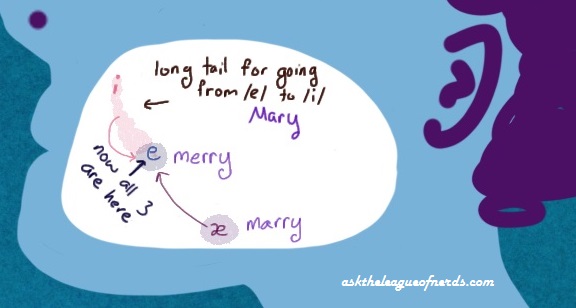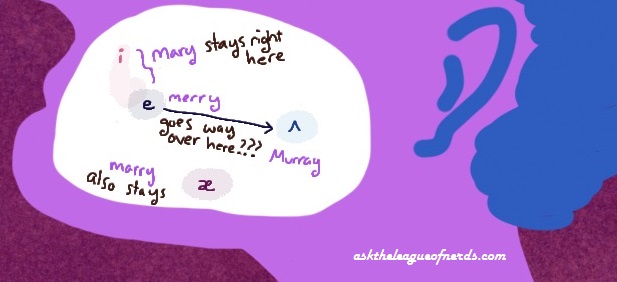Why do people in the South say “merry” and “marry” and “Mary” the same?
Bob
***
Dear Bob,
Why the South? That’s the way it’s done all across the States. Well, mostly.
There are a handful of people who make three different sounds here, which I’mma go over with that International Phonetic Alphabet we learned that one time, because damned if this ain’t just what it’s for. For these folks “merry” has the vowel /e/ (the same sound as in “met”), “marry” has /æ/ (like in “mat”), and “Mary” has /ei/ (like in “mate,” where it’s actually two sounds — you start with /e/ and slide up). This was the norm all over America around seventy years ago.
But for most people these three vowel sounds have merged. That happens a lot before /r/ sounds – you get the same thing in “Barry” and “berry” or “ferry” and “fairy.” See, when you make a vowel sound, your tongue doesn’t touch anything, it just shapes the air coming out of your mouth. That’s the big difference between making a vowel sound and making most consonants – for /t/ or /s/ or /k/ or whatever your tongue is actually touching the top of your mouth.* But /r/ is a consonant, and yet your tongue still doesn’t touch anything. It’s all loosey-goosey in there, and that makes it easy for the vowel sounds before /r/ to float around and bump into each other.
Mergers aren’t uniform. You get your merry/Mary/marry all-the-same crowd and your three-different-sounds crowd, but some people have thrown two of these guys together and left the third one out. And then there’s Philadelphia, which has its own thing going on. “Mary” and “marry” are still separate, while “merry” wandered off in a different direction entirely and merged with “Murray” instead.
So I guess I better update that title: have yourself a merry/Mary/marry/Murray little Christmas, and a happy New Year.
Yours,
The Language Nerd
*That’s not the only possible way to make a consonant — with /b/ your lips are touching, with /f/ one lip is touching your teeth, and “th” has the ridiculous tongue-on-teeth thing. There’s options, is what I’m saying.
Got a language question? Ask the Language Nerd! asktheleagueofnerds@gmail.com
Twitter @AskTheLeague / facebook.com/asktheleagueofnerds
So here’s one rad thing about grad school: I have access to the amazing Atlas of North American English, by William Labov, Sharon Ash, and Charles Boberg, which is where the info in this post comes from. The downside is that I’ve had no time for writing, as I guess you can tell by the tragic lack of posts. The other upside is that I’m working on a couple of y’all’s questions with new improved grad-school skills, like those wacky statistics. So there’s gonna be a continuing dearth of posts around here, but when I do get them out they’ll be even fancier, with like, graphs and shit.

